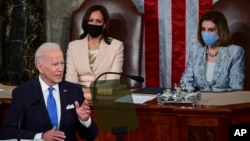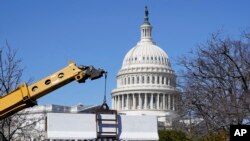Escalating conflict in Ukraine, the COVID-19 pandemic and — as always — the economy, are likely to dominate President Joe Biden’s first State of the Union speech on Tuesday.
The constitutionally mandated address is the rhetorical highlight of the year for the U.S. president, and Biden is no exception. But this year’s State of the Union — Biden’s first, although he has previously addressed a joint session of Congress — comes at an especially fraught time.
As if to underscore that, Capitol Police said Sunday that they were taking extra precautions at the site of the speech.
“Out of an abundance of caution, and in conjunction with the United States Secret Service, a plan has been approved to put up the inner perimeter fence around the Capitol building for the State of the Union Address,” said United States Capitol Police Chief Tom Manger. “I have also requested support from outside law enforcement agencies as well as the National Guard to assist with our security precautions.”
Administration officials say Biden will focus on four domestic economic priorities: increasing manufacturing in the U.S. and strengthening supply chains; working to bring down prices of goods; promoting fair competition in order to protect small businesses; and eliminating barriers to good-paying jobs.
Ukraine crisis
The White House says Biden will discuss Russia’s invasion of Ukraine and also his wider view of the world. White House press secretary Jen Psaki said Biden will cover many aspects of the crisis in Ukraine.
“The president will lay out the efforts we are taking, he has taken, he has led on, to rally the world to stand up for democracy and against Russian aggression. He will talk about the steps we've taken to not only support the Ukrainian people with military and economic assistance, but also the steps he's taken to build a global coalition imposing crippling financial sanctions on President (Vladimir) Putin, his inner circle and the Russian economy. And he will talk about the steps he's taken to mitigate the impact of President Putin's invasion of Ukraine on the global economy and the American people,” Psaki said.
In the past week, Biden has delivered three speeches on the escalating crisis in Ukraine. But in his own deeply politically divided nation, analysts say Biden should expect a frosty reception when talking about what he describes as the greatest threat to global security since World War II.
“The country generally rallies behind a president when we face an international crisis,” said Norman Ornstein of the American Enterprise Institute. “If you watch [Fox News TV host] Tucker Carlson, or listen to Donald Trump, or know what many Republicans in Congress have been saying, we're not going to get that rallying around the president by a significant share of the population. The tribal divisions are there now, for even things that affect American national security.”
Recent public opinion polls indicate the president’s approval rating has dipped since the early days of his administration, when the Gallup survey reported 57% of Americans said they approved of the job he was doing. The same group’s poll conducted in the first half of February reported Biden now has a 41% job approval rating.
On Monday, Republican House Minority Leader Kevin McCarthy announced he was holding a virtual alternative version of the event Tuesday afternoon, in which members of his party planned to "address the policies that President Biden and his administration have continued to ignore: rising crime in our streets, chaos at our southern border, the highest rate of inflation that the United States has experienced in 40 years, and millions of families who have suffered through disrupted education."
Always the economy
Presidents typically use this speech to sell Congress on their domestic agenda and bills they want to pass. And there is one topic every president is expected to cover in the State of the Union address, said Jeremi Suri, a historian at the University of Texas at Austin.
“He will argue that the economy is growing, that unemployment is low, and that we are going in the right direction and that inflation has to do with supply difficulties and pandemic difficulties, which he is working diligently to solve, and which will be resolved soon,” he said.
“And every president comments on the economy because they all want to say the state of the economy is such that we are getting richer, we are doing better than ever before. The only exceptions when presidents don't talk about the economy are when we are at war ourselves,” he added.
A senior administration official told reporters Monday that “the president will make clear that there's more work to do, that there's more work to rebuild the economy, toward resilience, security and sustainability. ... The president will lay out his plan to lower costs for American families while continuing historically strong economic recovery.”
The address begins at 9 p.m. Washington time, on Tuesday.








